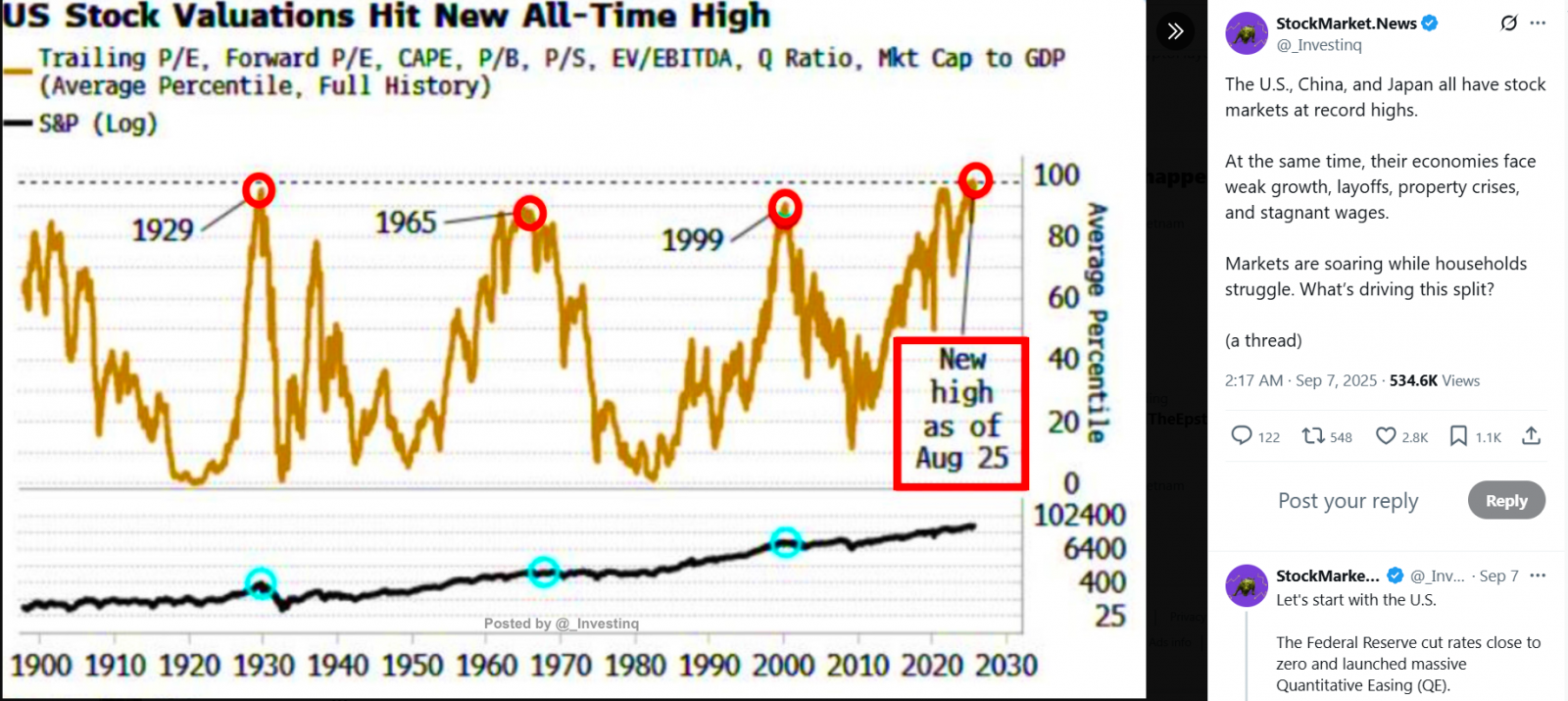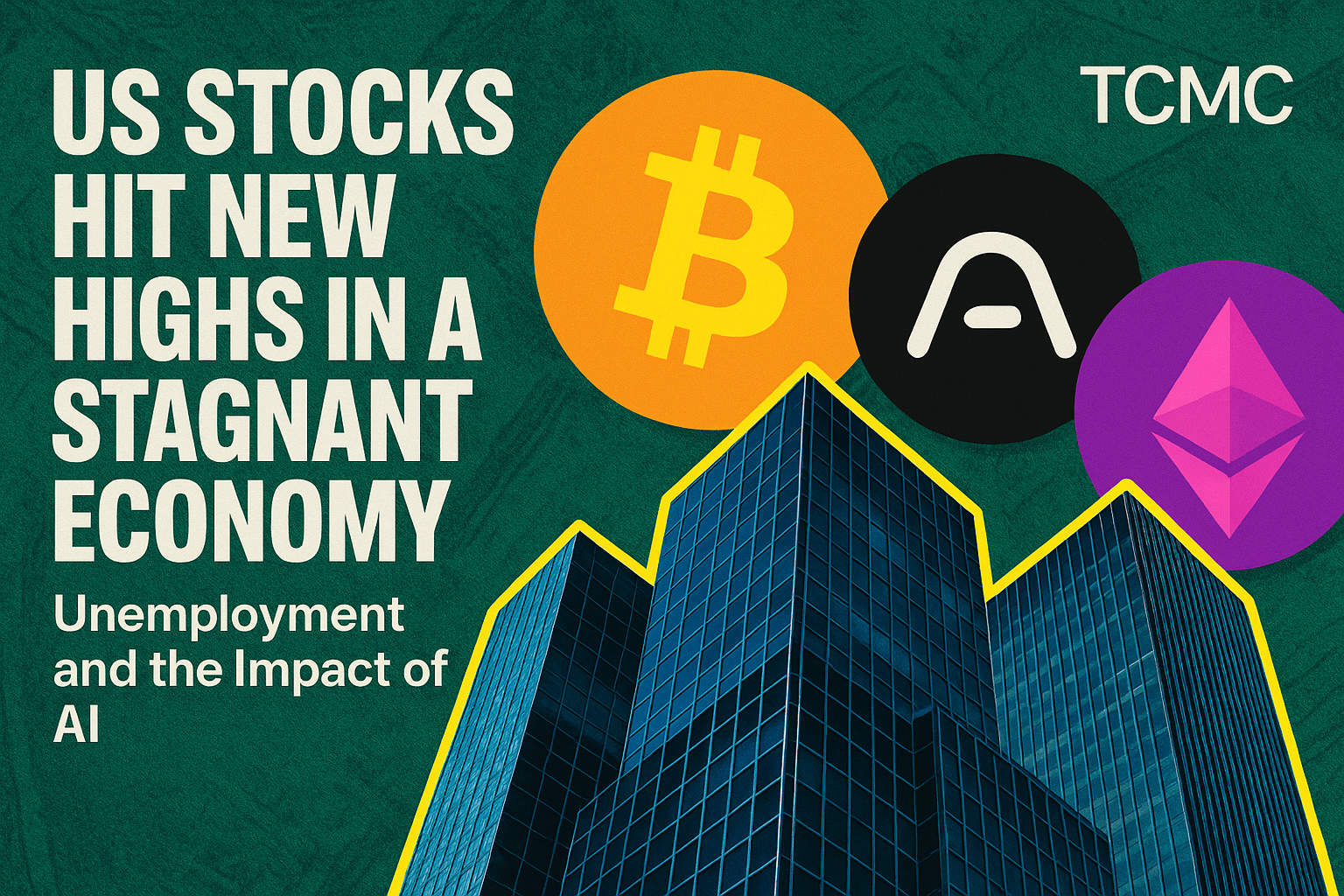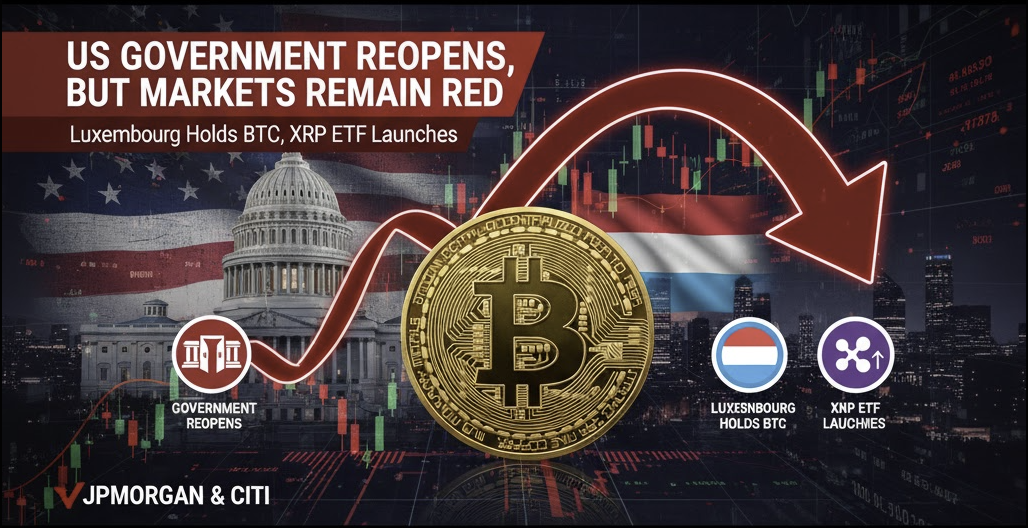This week, the market will be focused on key economic data. On September 10th, the US will release its PPI index, while the ECB is expected to hold interest rates at 2.15%. On September 11th, the US will announce its CPI, Core CPI, and jobless claims—data points that could directly influence expectations for the Fed's monetary policy. The market is hopeful that these figures will be stable or positive to reinforce the possibility of the Fed cutting interest rates three times from now until the end of the year. Additionally, the weekly jobless claims data (forecasted at 234,000 versus 237,000 previously) will also be monitored to assess the health of the labor market.
Market Paradox: Global Stocks Hit New Highs Amidst Economic Stagnation
Currently, the United States, China, and Japan are all witnessing a paradox: stocks are hitting new all-time highs while the real economy is stagnant, unemployment is rising, the real estate market is in crisis, and incomes are not improving. The wealth gap is therefore widening, reflecting a separation between finance and real life.

In the United States, this situation began in 2020 when the Fed lowered interest rates to near 0% and injected a massive amount of money for relief, causing capital to flood into stocks and risk assets. After the pandemic, when interest rates rose again, bonds plummeted, forcing pension funds to push money into stocks. US companies also spent trillions of dollars on share buybacks, which helped the market grow, primarily driven by 10 major corporations, while most other businesses stagnated. The richest 10% own 88% of all stock market assets, while the majority of the population is burdened by debt and soaring living costs.
China, meanwhile, is facing the risk of prolonged deflation. Despite the government continuously cutting interest rates, reducing taxes, and injecting money over the past three years, the economy remains sluggish, consumption is weak, and youth unemployment is rising. The stock market is being sustained by speculative capital from retail investors, who account for up to 80% of transactions, with popular trends revolving around AI and technology. However, this dependence on speculative sentiment leaves the market vulnerable to a potential bubble and sudden collapse, similar to what happened in 2015.
In Japan, the Nikkei index has surged to its highest level since the bubble of the 1980s, but the primary driver is the interventionist policy of the Bank of Japan. For years, the BOJ has not only bought bonds but also directly holds up to 70% of ETFs, creating artificial demand for the market. A weak yen supports exports and attracts a massive influx of foreign capital, but the real incomes of the general population have not improved, domestic demand is weak, and the gap between financial assets and real life continues to widen. Overall, all three economies show that the stock market's prosperity is based on loose policies and cheap money, rather than reflecting the true health of the real economy. This exacerbates inequality and poses a risk of instability when capital flows reverse.
The Non-Logical Nature of Financial Markets
The AI wave is fueling investment confidence, with the tech industry's revenue and spending doubling in just 18 months. Giant corporations like Amazon, Apple, Google, Microsoft, Nvidia, and Oracle now account for a third of the total market capitalization of the entire industry. They are pouring money into massive data centers, leading investors to bet on future productivity rather than the current economic health.
In reality, in the US, China, and Japan, stocks are rising due to cheap money and loose policies while the real economies stagnate: inflation and household debt are high, wages are not increasing, and real estate is unstable. The US is a prime example, with companies using capital for share buybacks instead of expanding production. The real estate market has also slowed, even with high home prices, as the Fed's interest rates remain elevated.
Many long-time experts have predicted a new financial crisis, but it has not happened in the past 17 years. The lesson is that financial markets do not operate on purely logical principles. During the 2008 crisis and the 2020 pandemic, stocks and crypto still rose despite poor economic data. Therefore, a forecast of a "collapse in the next 1–2 years" is merely a hypothesis, not a certainty.
AI, Employment, and the Future
Technology, especially AI, is profoundly changing the structure of employment and traditional career paths. Recent reports show that entry-level positions, which are the starting point for recent graduates and less-experienced workers, are disappearing rapidly. Since 2019, hiring for workers with less than one year of experience has dropped by nearly 50%. Jobs such as information gathering, customer support, and basic tasks in law, accounting, and auditing—previously handled by new employees—can now be managed efficiently by AI. This is increasing youth unemployment and forcing new graduates to proactively improve their skills, especially in technology and AI, to adapt to the market.

The underlying cause of this transformation stems from increasingly flat organizational structures, which are designed to accelerate the flow of information from the lowest-level employees to the CEO. This eliminates many intermediate positions and requires new hires to have higher skills from the start. Similar to the industrial revolutions of the 18th and 19th centuries, when machines replaced manual labor, leading to short-term unemployment and economic crises, AI is creating similar "scars" in the modern labor market. In the long term, just as new industries from transportation and banking to manufacturing emerged after the industrial revolution, AI promises to create new jobs and improve the quality of life, but this process will take decades.
In the short term, the replacement of labor by AI could increase unemployment, lead to financial downturns, and force central banks like the Fed to intervene, while also devaluing fiat currencies. Therefore, assets and skills are becoming the main tools to protect the value of labor and maintain adaptability in a rapidly changing world.
Other Key Crypto & Market Updates
Venezuela is experiencing hyperinflation of 229%, causing its currency, the bolivar, to depreciate heavily. Citizens are turning to USDT, often called "Binance dollars," to pay for goods, salaries, and services due to its stability and convenience compared to cash or banks. The country now ranks 9th globally in crypto usage per capita, with stablecoins accounting for nearly 50% of retail transactions. The government's capital controls have driven the formation of a parallel market, where both businesses and banks are increasingly using USDT to circumvent restrictions.
Trump Media has purchased 684 million CRO tokens from Crypto.com for approximately $0.15 per token, through a transaction that was 50% stock and 50% cash. This deal includes a strategic partnership, allowing for the integration of CRO into Truth Social and Truth+ as part of a rewards system, based on Crypto.com's digital wallet infrastructure.
Fidelity has launched the Fidelity Digital Interest Token (FDIT) on Ethereum, a tokenized version of a $200 million government bond money market fund. This move follows BlackRock's BUIDL fund, which leads the tokenized treasury market with a value of $7 billion.
President of El Salvador Nayib Bukele purchased 21 BTC to commemorate Bitcoin Day on September 7th, which marks the day El Salvador became the first country in the world to adopt Bitcoin as legal tender in 2021.
Sources
- The New York Times
- Fox Business
- Bloomberg
- Statista
- TradingView
- Reuters
- SEC
- Federal Reserve
- Truth Social
- Crypto.com
- Fidelity
- El Salvador Presidency
Disclaimer
This article is for informational purposes only and should not be considered financial advice. Please do your own research before making investment decisions.


.png)





